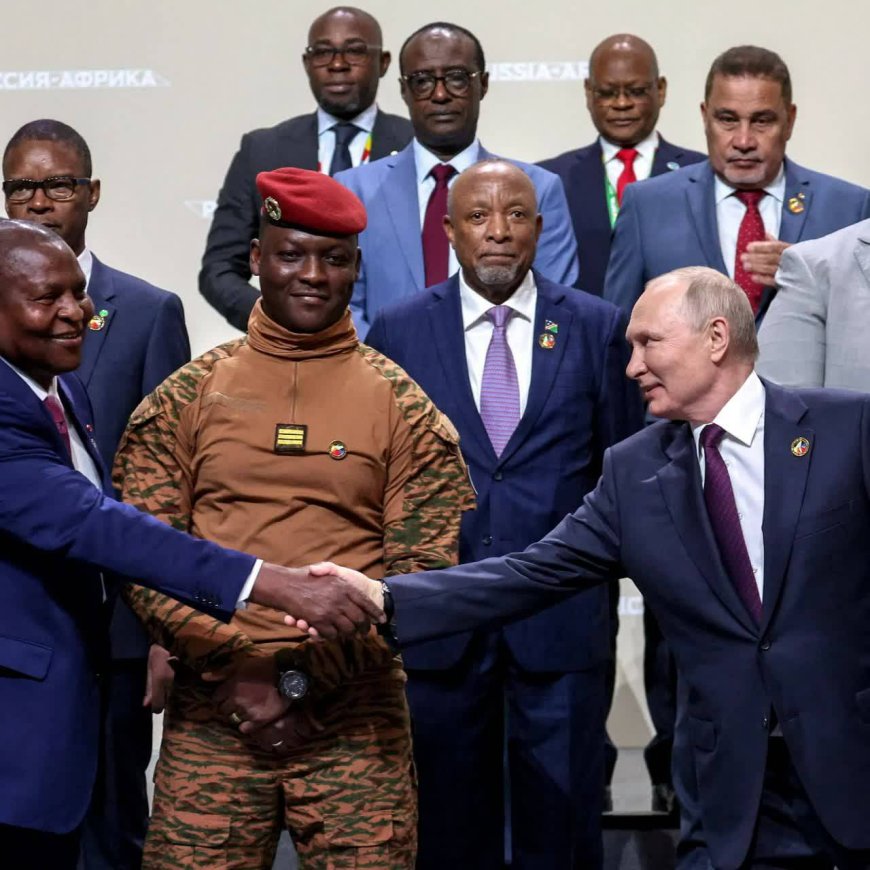Russia's Engagement in Africa: Moscow's Quest to Strengthen Ties and Challenge Western Influence
Russia's Engagement in Africa: Moscow's Quest to Strengthen Ties and Challenge Western Influence

Last week, a high-level meeting between African nations and Russia convened in Saint Petersburg. This gathering, initiated by Russia as part of its efforts to bolster relations with African countries, experienced a decrease in attendance compared to previous years due to pressure exerted by Western nations.
During his opening address, Russian President Vladimir Putin, a key architect of the meeting, underscored the significance of Africa's geopolitical position and expressed support for elevating the level of engagement between African nations and Russia. Notably, he made a generous pledge to donate wheat and grains to African countries. Putin emphasized the importance of nurturing ties between African nations and Russia, particularly in contrast to Western countries. Significantly, Russia's offer to provide free grains to Africa coincided with its decision to disrupt grain transfers from Ukraine, an action that elicited negative reactions from Western nations.
Examining Russia's multifaceted efforts to expand its influence on the African continent reveals several dimensions:
1. Military aspects: Russia places great importance on the military dimension of its relations with Africa. As one of the world's leading arms exporters, Russia aims to leverage these ties to bolster its defense industry and generate the necessary currency to sustain and expand its military capabilities. Moreover, Russia's military presence in African countries can serve as a showcase of its advanced military technologies, enticing potential buyers from around the world. By providing weapons to countries in close proximity, Russia not only strengthens these nations but also helps stabilize their leadership, mitigating the risk of coups and border conflicts with rebel groups. This arrangement is viewed as mutually advantageous.
2. International implications: Strengthening ties with Africa serves to diminish the influence of Western powers on the continent while challenging the historically entrenched colonial policies of European countries. France, which has long considered itself a dominant force in African affairs, opposes Russia's growing presence. Additionally, the potential for coups in countries near Russia may increase, as the loss of African nations to the Western front would mean relinquishing access to the continent's abundant natural resources, which are not easily replaceable by the West. Moreover, the African continent holds strategic importance as a transportation hub for Western countries seeking access to eastern territories via maritime routes. The limited access to African natural resources poses a critical challenge for the West.
3. Economic dimensions: Russia's engagement in Africa extends beyond its own economic interests, creating added value for other countries such as China, Iran, and nations aligned with this axis. Facilitating the development and progress of African nations is seen as a means of ensuring equitable exploitation of natural resources. By establishing international corridors and fostering economic cooperation in the region, Russia contributes to conceptual victories for African countries that have long been deprived of sustained development. Consequently, African nations are eager to participate as extensively as possible. For Russia, cultivating bilateral relations with foreign countries generates reciprocal benefits, partially offsetting the impact of Western sanctions.
To comprehensively assess the increasing influence of Russia in Africa, it is crucial to approach the analysis from the standpoint of African countries themselves. These nations possess abundant natural resources, yet have faced numerous challenges and setbacks due to the historical presence and actions of Western powers. Now, with a changing global order and the opportunity for transformation, African countries seek to rectify their circumstances and seize this moment. It has been observed that amidst international disorder and upheaval, countries often strive to maximize their advantages. The African continent, therefore, presents a fertile ground for such change. African nationalist leaders shoulder the responsibility of seeking retribution for centuries of slavery and humiliation inflicted by Western nations. By making astute choices on the international stage, they can realize their longstanding aspirations and restore Africa to its rightful place as a prominent global force.













































